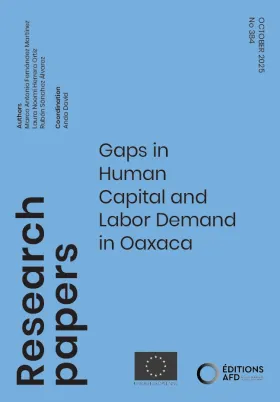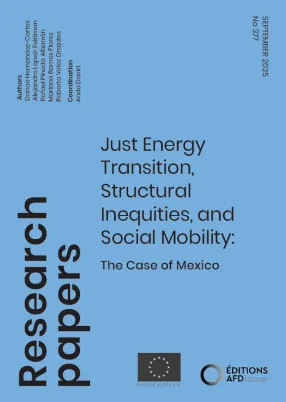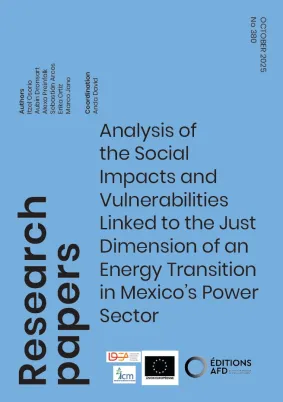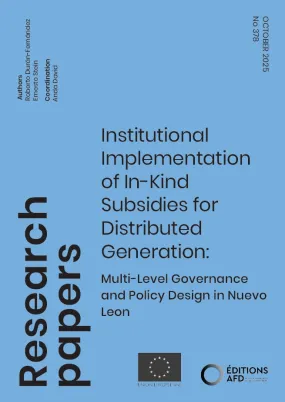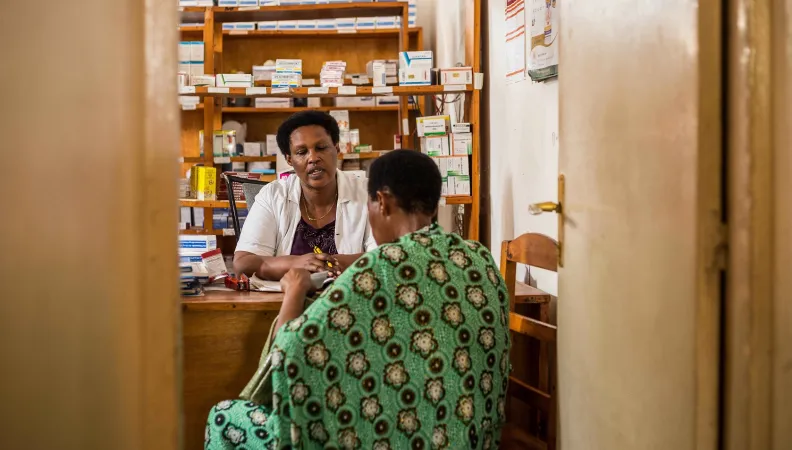 Africa remains a young continent. However, the ongoing demographic transitions are accompanied by an anticipated aging population — and in some countries, this process has already begun. Although a wide variety of situations coexist across the continent, the growing number of older people will require significant adjustments to public policies, including fiscal, health, and social measures.
Africa remains a young continent. However, the ongoing demographic transitions are accompanied by an anticipated aging population — and in some countries, this process has already begun. Although a wide variety of situations coexist across the continent, the growing number of older people will require significant adjustments to public policies, including fiscal, health, and social measures.
Context
In many African countries, older people still represent a very small share of the population (3% in sub-Saharan Africa and 5.6% in North African countries). For a long time, they have been largely overlooked by public policies, which have focused instead on the most urgent needs of economic, social, and health development — primarily targeting children and young adults.
However, the number of older people is increasing — not only in absolute terms but soon also in relative terms, with aging projected to occur more rapidly than in other regions. The challenge now is to design and implement appropriate public policies to support this demographic shift, particularly in the areas of health and social protection.
New forms of coverage and protection are emerging — or becoming essential — such as cash transfers, which complement family-based solidarity systems, free healthcare and services for older adults, the expansion of so-called universal pension and retirement schemes, and more broadly, private support systems on which most older people on the continent must still rely.
Objectives
This research project provides a framework for understanding population aging and related public policies across the African continent, from a comparative perspective. It examines the aging process, its associated challenges, the public policies addressing it, and the institutional frameworks in various countries, focusing on emblematic case studies that reflect diverse situations (South Africa, Cameroon, Cape Verde, Kenya, Morocco, and Senegal). The project also includes targeted analyses based on recent data, highlighting the contributions of demographic research to issues of health and social protection (notably pensions) for older adults.
The project resulted in a valuable overview for policymakers in AFD’s partner countries, contributing to broader reflections on the conditions under which different public policy models may or may not be replicated across the African continent.
Method
The project is based on a comparative analysis of secondary demographic data drawn from existing sources — including research papers, reports, and scientific literature. By presenting the different trajectories of demographic transitions, it offers an overview of aging across the continent, including its timing and context, and explores the associated challenges for both national and local public policies. It highlights regional, national, and subnational variations in aging, in order to identify the areas that are either most advanced in this process or experiencing the fastest pace of change.
Focused case studies on a selection of countries representing different situations provide a systematic critical review along the following lines:
- a socio-demographic and health overview;
- a description of the institutional framework and public policies in place;
- a critical analysis of the social and health-related challenges of the aging process;
- and an exploration of how aging is transforming family structures — particularly regarding intergenerational transfers, migration patterns, and women’s labor participation.
Results
The research project led to the following publications:
- The publication of the research paper “Africa Facing Its Aging Population: What Are the Challenges for Public Policy?” (in French, June 2024);
- The release of “How can healthcare for older people in sub-Saharan Africa be improved?” (April 2024);
- The publication of “Health Statistics on Older Adults in Sub-Saharan Africa: A Literature Review” (in French).
In July 2023, a webinar from the Research Conversations series presented the project’s initial findings (in French only):
Research findings
Africa is expected to face the challenge of an aging population in the coming decades. The first and foremost challenge lies in expanding social protection coverage, which is currently the lowest in the world: only 17% of the population is covered. This low rate is partly due to the predominance of the informal economy, which hinders the development of a contributory social protection system — particularly in rural areas. There is now a pressing need to strengthen public policies aimed at expanding social protection to a broader share of the population, both in rural and urban areas.
However, the evolution of social protection systems — particularly in health and pensions — rests on several key pillars that remain uncertain and have historically been prerequisites for their expansion:
- First, the effective collection and use of tax revenues to finance social protection;
- Second, the promotion of stronger links between pension and health coverage;
- And finally, sustained economic growth driven by a development model — historically industrial and manufacturing-based — that enabled the establishment of such public policies.
Yet in Africa, this economic model, centered on formal employment, has not taken root. Moreover, the impacts of climate change are raising fundamental questions about this development path, making it even more difficult to design and implement aging-related public policies — just as they are becoming increasingly necessary.
READ OUR RESEARCHER'S INTERVIEW
Serge Rabier: ‘Many African Countries Have No Social Protection Programmes For Elderly’
Want to stay updated on AFD’s latest research?
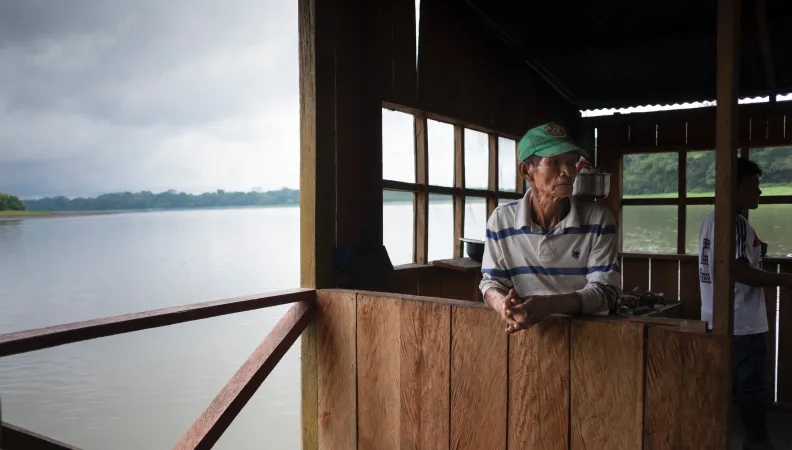 Legal notice EU (project) How can green transition policies impact labour market segmentation between formal and informal sectors in Colombia? What consequences on income inequality after retirement? The Extension of the EU-AFD Research Facility on Inequalities program seeks to explore these questions in collaboration with Universidad de los Andes.
Legal notice EU (project) How can green transition policies impact labour market segmentation between formal and informal sectors in Colombia? What consequences on income inequality after retirement? The Extension of the EU-AFD Research Facility on Inequalities program seeks to explore these questions in collaboration with Universidad de los Andes.
Context
The design of the Colombian pension system exacerbates income inequality and poverty after retirement age. High informality rates (over 60% of total employment, according to OECD) imply that many workers in Colombia have a low probability of qualifying to get a contributory pension. Despite the targeted support provided to the vulnerable population through pension assistance programs, this support tends to be low compared to other countries in Latin America and the Caribbean.
The relationship between informality and inequality after retirement plays a central role in the discussion of policies affecting the labour market. One dimension that has not been explored in the public policy debate is how policies aimed to mitigate climate change (and more specifically the creation of green jobs) can affect the distribution of workers between the formal and informal sectors, and how it can have an impact income inequality after retirement.
This project is part of the Extension of the EU-AFD Research Facility on Inequalities. Coordinated by AFD and financed by the European Commission, the Extension of the Facility will contribute to the development of public policies aimed at reducing inequalities in four countries: South Africa, Mexico, Colombia and Indonesia over the period 2021-2025.
Objectives
This project seeks to contribute to the public policy debate by analysing the effects that scenarios of a green economic transformation may have on income inequality after retirement, via the reallocation of workers between the formal and informal labour markets.
The project will aim to answer following questions, in the Colombian context:
- What are the environmental properties of jobs?
- How can economic transformation towards a more sustainable economy change the composition and transitions between the formal and informal sector?
- What is the impact on inequality and fiscal viability of implementing those policy scenarios?
In addition, the project will evaluate prospective scenarios during the discussion of the pension reform in the Colombian Congress and will develop a simulation model for the use of the Ministry of Finance and Public Credit.
Method
The project will be implemented in three stages:
- The research team will first characterize the environmental properties of jobs in Colombia.
- In the second stage, the team will calibrate the transition matrices between employment states and wages to introduce to the microsimulation model. In this stage, the team will propose the economic transition scenarios to simulate.
- In the final stage of the project, the team will prepare a final report with the simulation results and policy discussion.
Research findings
You will find below the different research papers related to this project:
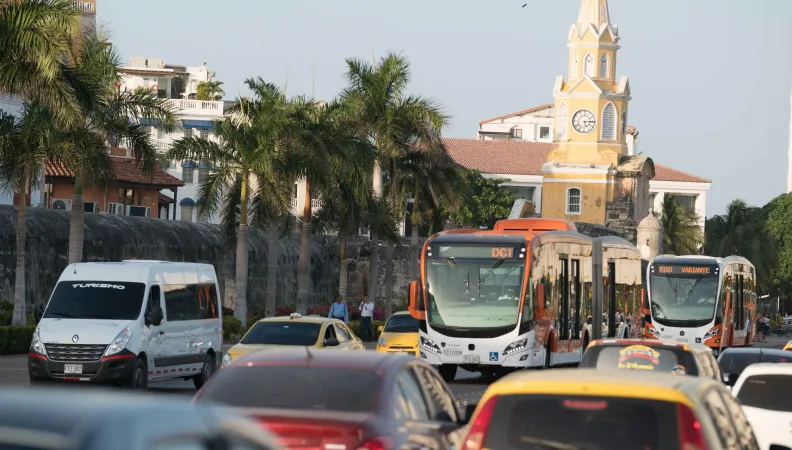 Legal notice EU (project) What has been the redistributive impact of social and fiscal policies in Mexico and Colombia, in the context of the policies implemented during the Covid-19 pandemic? The EU-AFD Research Facility on Inequalities will seek to answer this question in collaboration with the Institute for Inequality Studies (INDESIG).
Legal notice EU (project) What has been the redistributive impact of social and fiscal policies in Mexico and Colombia, in the context of the policies implemented during the Covid-19 pandemic? The EU-AFD Research Facility on Inequalities will seek to answer this question in collaboration with the Institute for Inequality Studies (INDESIG).
Context
While there is mounting evidence that the Covid-19 pandemic has increased socioeconomic inequality, there is still a need to understand the exact channels of impact and what role the policy response has played in different contexts. It is also necessary for governments to be clear about the efficiency of the type of policies they have implemented throughout this period, in terms of the redistributive and/or regressive effect both from an inequality and poverty perspective. Indeed, we know that the amount of additional social spending (excluding health) implemented during the pandemic reached almost 3% of GDP in Colombia and only 0,2% in Mexico. However, research has not yet demonstrated whether the redistributive policies introduced by the Mexican and Colombian governments in response to the Covid-19 crisis have had any positive effect on the distribution of economic and social resources in these two countries.
This project is part of the call for research proposals “Advancing the inequality agenda through collaborative research: identifying the priorities for a global Team Europe approach on inequalities”, launched by the Strategic Committee of the Research Facility on Inequalities. It is coordinated by AFD and co-financed by the European Commission, AECID and ENABEL.
Objective
The project will seek to understand what has been the redistributive impact of social and fiscal policy in Mexico and Colombia, in the context of the policies implemented during the Covid-19 pandemic.
Method
This research project will be conducted as follows:
- Using the framework of the Commitment to Equity (CEQ) methodology, an analysis aiming to differentiate what has been the progressivity or regressivity of the policies implemented during the Covid-19 pandemic will be conducted. This analysis will take into account the main beneficiary groups of these policies and will include a comparison between the budget amount and the efficiency of the policies identified in terms of inequality and poverty reduction.
- A desktop analysis of the decision-making will also be carried out to understand how the redistributive effects of the policies implemented were envisaged by the governments.
Results
The results of this project are presented in the following research paper: Promoting a More Progressive Approach - Evaluating the Impact of Social and Fiscal Policies in Mexico and Colombia amidst the Covid-19 Pandemic (2025)
This research paper analyzes the redistributive impact of some fiscal policies and social programmes (direct taxes and transfers) before and after the pandemic Crisis in Mexico and Colombia, following the CEQ methodology.
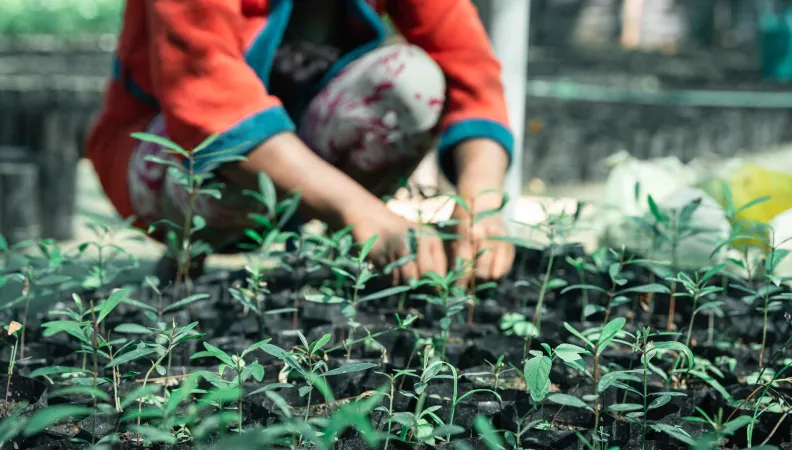 Legal notice EU (project) How can we measure the efforts made by developing countries to combat the inequalities and the impacts of climate change while taking into account the socioeconomic structure of these countries? The EU-AFD Research Facility on Inequalities will seek to answer this question in collaboration with the Ghanaian research think tank Placefeet.
Legal notice EU (project) How can we measure the efforts made by developing countries to combat the inequalities and the impacts of climate change while taking into account the socioeconomic structure of these countries? The EU-AFD Research Facility on Inequalities will seek to answer this question in collaboration with the Ghanaian research think tank Placefeet.
Context
Many of the measures on quantifying progress by countries towards reducing income inequality have focused on indices that measure trends in inequality over time (Gini coefficient for example) and compare countries without considering the differences between their socioeconomic structures.
However, these indices do not paint the complete picture about how countries are performing, especially when compared to one other in achieving Sustainable Development Goals and what policies and investments may be needed to support them. This research project will provide an alternative measurement of income inequality by taking into account the developing countries’ structural or predetermined conditions (mineral assets, type of institutions etc.) in assessing their progress towards reducing inequality and the impacts of climate change.
This project is part of the call for research proposals “Advancing the inequality agenda through collaborative research: identifying the priorities for a global Team Europe approach on inequalities”, launched by the Strategic Committee of the Research Facility on Inequalities. It is coordinated by AFD and co-financed by the European Commission, AECID and ENABEL.
Objectives
The project focuses on the following objectives:
- Firstly, it will compare each country with its potential to reduce income inequalities by measuring the scope for improvement for each country at every year. This will allow a better understanding of the key factors that hinder a country’s effort and performance in reducing inequalities and of the policy and investments that are needed to tackle inequalities more efficiently.
- Secondly, it will investigate how climate – temperature, precipitation and extreme weather events– influence the efficiency of countries in combining inputs to reduce inequality.
- Thirdly, it will look at adaptation or intensification effects across regions, particularly in LDCs and SIDS and will identify the needed scale of investments.
Method
Building on a panel database on 145 countries, including countries from Least Developed Countries (LDCs) and Small Island Developing States (SIDS) from 2000-2020, the project will use a stochastic frontier approach, an economic modelling technique, to estimate feasible frontiers for income inequality for each country and year.
Results
You will find below the different research papers related to this project:
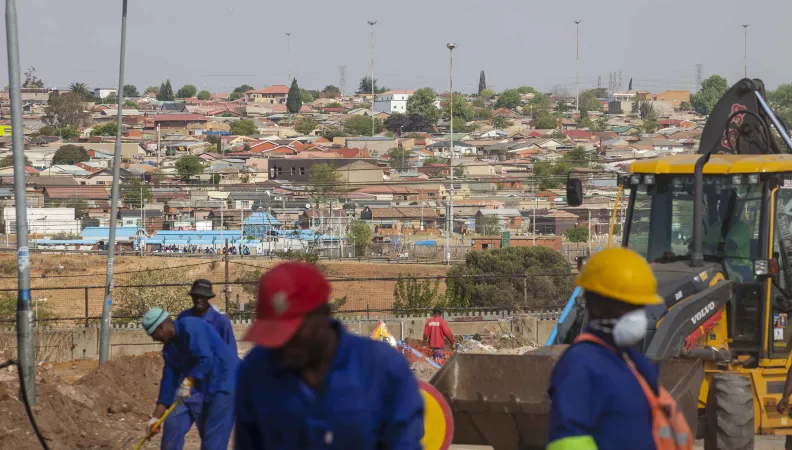 Legal notice EU (project) How could the Social Relief Distress grant be redesigned to maximize impact on poverty and unemployment reduction, while being sustainable in the longer term? The Extension of the EU-AFD Research Facility on Inequalities will seek to answer this question in partnership with SALDRU (University of Cape Town – Southern Africa Labour and Development Research Unit).
Legal notice EU (project) How could the Social Relief Distress grant be redesigned to maximize impact on poverty and unemployment reduction, while being sustainable in the longer term? The Extension of the EU-AFD Research Facility on Inequalities will seek to answer this question in partnership with SALDRU (University of Cape Town – Southern Africa Labour and Development Research Unit).
Context
South Africa’s Economic Reconstruction and Recovery Plan was launched in October 2020 by the Presidency in response to the economic impacts of the Covid-19 pandemic. Besides the Presidential Employment Stimulus program, it included emergency social protection measures, among which the introduction of a special Covid-19 Social Relief of Distress grant (SRD), providing ZAR350 per month for unemployed people not covered by any other form of support. The South African government now seeks to develop options for the future of SRD grant.
This project is part of the Extension of the EU-AFD Research Facility on Inequalities. Coordinated by AFD and financed by the European Commission, the Extension of the Facility will contribute to the development of public policies aimed at reducing inequalities in four countries: South Africa, Mexico, Colombia and Indonesia over the period 2021-2025.
Objectives
The objective of this research project is to produce motivated recommendations on how the SRD should be designed going forward into the longer term, in order to maximize the impact of the grant on employment outcomes and to ensure it effectively reduces poverty, while maintaining its cost to an acceptable level:
- To maximise the impact of the grant on employment, the project needs to understand how to design and label the grant to encourage its use for job search.
- To ensure the grant effectively reduces poverty, the project must figure out the most cost-effective way to target and assess the eligibility of recipients. Moreover, poverty reductions can be scaled up by determining measures that could encourage take up among the most disadvantaged.
Once these goals have been achieved, and in order to inform public decision-making, these findings must be communicated to a number of stakeholders in government and civil society.
This project is part of a wider research program conducted with several South African research centres and in close collaboration with the South African Presidency. Four other research projects analysing the externalities of the Covid-19 stimulus policy are currently being developed as part of the first pillar of the Extension's activities in South Africa.
Method
This research project uses the model generated to conduct the 2014/2015 fiscal incidence assessment and introduces updated data for 2019-2021. It simulates five scenarios around eligibility criteria, targeting mechanisms, value, disbursement model and conditionalities and computes the potential impact on poverty and employment outcomes.
Research findings
You will find below the research paper related to this project:
It is worth noting that another paper has been published on the implications of the SRD grant, funded by AFD outside the Research Facility on Inequalities: Systemic exclusion from a South African social assistance transfer (February 2024)
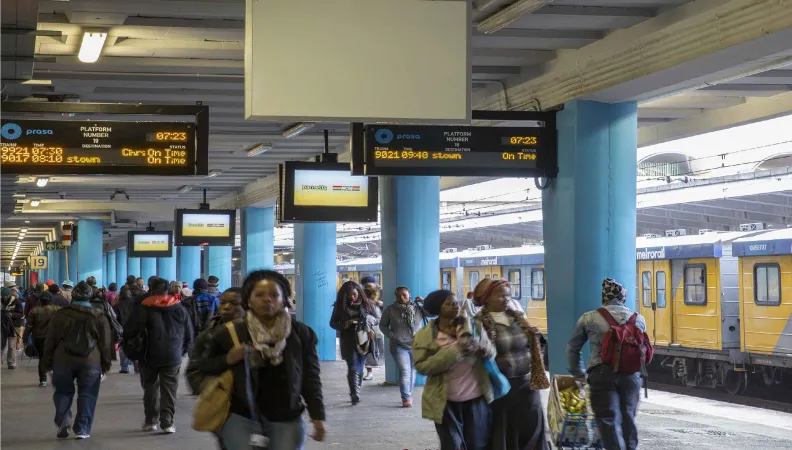 Legal notice EU (project) How do spatial variation in inequality and quality of institutions interact to explain variation in subjective wellbeing in South Africa? The EU-AFD Research Facility on Inequalities will seek to answer this question in collaboration with the University of Cape Town (UCT).
Legal notice EU (project) How do spatial variation in inequality and quality of institutions interact to explain variation in subjective wellbeing in South Africa? The EU-AFD Research Facility on Inequalities will seek to answer this question in collaboration with the University of Cape Town (UCT).
Context
Despite several efforts to promote pro-poor growth, South Africa remains one of the most unequal countries in the world. While the country's colonial history and apartheid are known to have contributed to this inequality level, the nature and dynamics of its impact on society are yet to be fully understood.
Literature suggests that better institutions and lower level of inequality improve subjective wellbeing. However, evidence that examine how the interaction between these two variables explain variation in wellbeing is relatively scarce. This study will thus contribute to a deeper understanding of inequalities in South Africa.
This project is part of the call for research proposals “Advancing the inequality agenda through collaborative research: identifying the priorities for a global Team Europe approach on inequalities”, launched by the Strategic Committee of the Research Facility on Inequalities. It is coordinated by AFD and co-financed by the European Commission, AECID and ENABEL.
Objectives
This research project has two main objectives:
- Explore how variations in governance (such as audit outcomes) across South Africa's district municipalities explain the variation in the well-being of individuals.
- Investigate how the interaction between the variation in governance across local government municipalities and inequality among individuals explains variation in subjective well-being.
Method
To investigate the interactions between the quality of institutions and of the governance, the level of spatial inequality and the subjective wellbeing, researchers will use the National Income Dynamics Study (NIDS), a nationally representative survey of individuals across South Africa, which is repeated over five waves between 2008 and 2017. They will also use audit outcomes of local municipalities to proxy for the quality of governance.
Results
You will find below the research paper related to this project:



